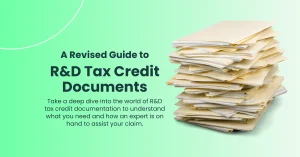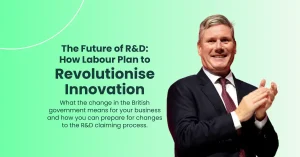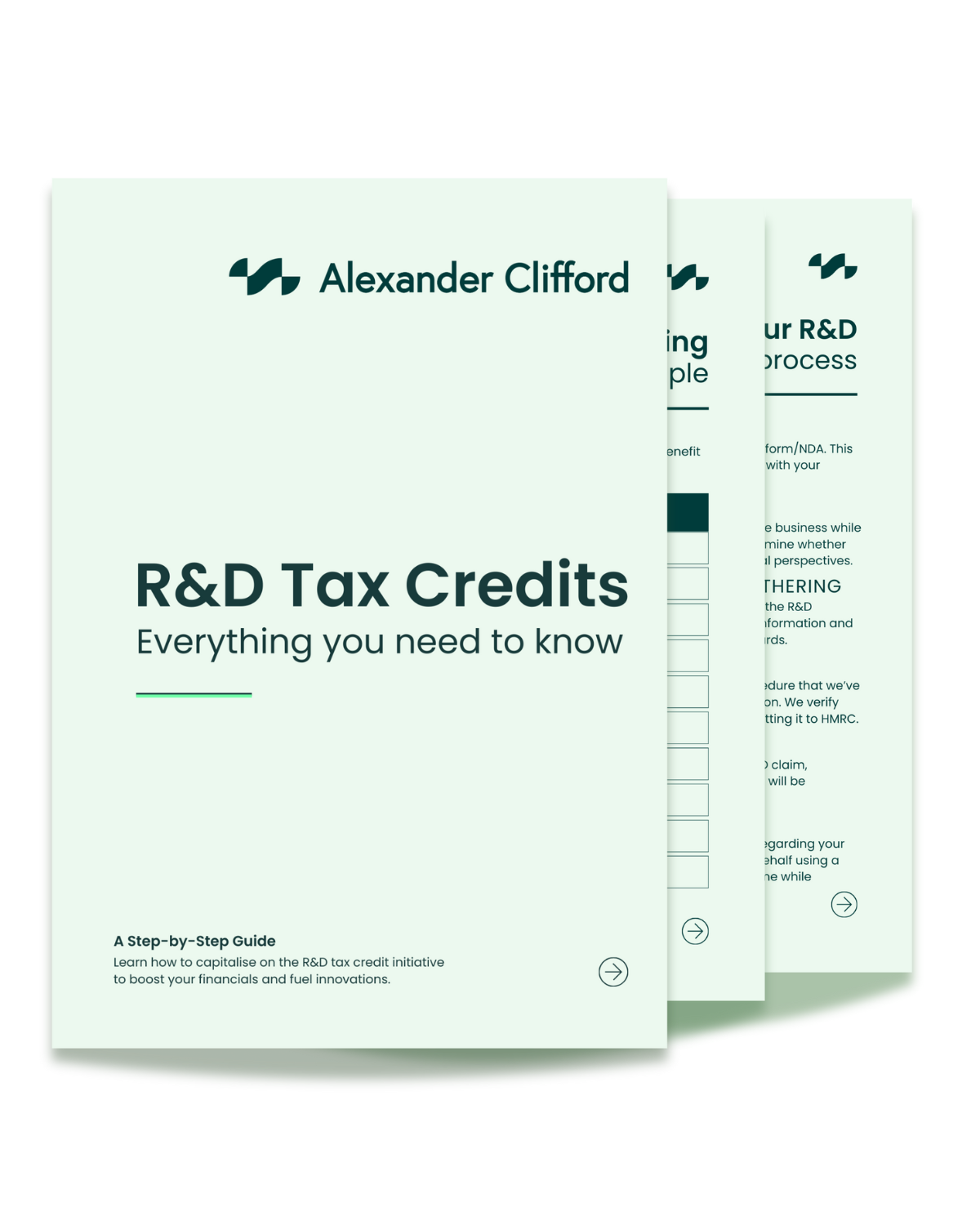Maximise R&D Tax Incentives: Insider Secrets Revealed by R&D Tax Specialists
4 June 2024

Discover how R&D tax specialists can help your business claim lucrative tax credits and incentives. Learn about the benefits, eligibility requirements, and the process of claiming R&D tax credits.
R&D Tax Specialists: Maximising Your Tax Credits and Incentives
Navigating the R&D tax relief process can seem overwhelming. Thankfully there exists out there, someone that can help guide you through the claims process, supporting you every step of the way. We’re talking about R&D tax specialists.
Throughout this article, we’ll explore what these specialists do, how their expert knowledge can aid you in your claim, and how your business may benefit from the R&D tax relief scheme.
Introduction to R&D Tax Specialists
First and foremost, an R&D tax specialist is there to help your business maximise tax relief in regards to your research and development activities. With expertise in tax codes, regulations and a professional insight into policy changes and how they may affect your claim, an R&D tax specialist will assist you throughout the claiming process to ensure that you have all the correct documentation to make a successful claim.
Their specific expertise is what sets them apart from regular accountants. While an R&D tax specialist focuses solely on R&D tax relief, whereas accountants are responsible for a broad range of financial tasks such as bookkeeping and financial planning, for which they need only general tax knowledge.
Benefits of Engaging R&D Tax Specialists
There are many benefits to working with a specialist. From their deep understanding of what a claim requires to their thirst for knowledge that afford them the ability to continually understand tax code updates, let’s take a look at how these research and development tax consultants become the perfect people to aid you in an R&D tax claim.
Maximising Tax Credits
By understanding and applying tax regulations to a businesses research and development activities, an R&D tax specialist can maximise upon an R&D claim, ensuring that all of your qualifying expenditure is accounted for. This begins when the specialist (with the businesses permission) conducts a detailed assessment of the businesses research and development projects in order to identify the qualifying expenses.
Following this, they’ll then compile accurate documentation that will support your claim, ensuring that it details the nature of your activities. The way in which they meticulously approach this documentation, allows them to minimise the potential risk of dispute with HMRC.
Expert Knowledge and Experience
A great R&D tax specialist will have an intense understanding of tax legislation in relation to research and development that includes HMRC’s documentation criteria in regards to making an R&D tax relief claim. Ordinarily, this will entail an in depth knowledge of relevant tax codes, the current regulations and compliance procedures. Similarly, the ideal specialist will be proficient in financial analysis, as tax credit calculation is a vital part of compiling a successful claim.
In addition to their knowledge of the process, a specialist will ideally have experience in successfully filing tax credit claims. This showcases their powerful analytical skills that prove their ability to evaluate complex projects across a variety of industries.
Equally as important is a specialist’s ability to stay informed of legislative changes and industry practices. Being able to do so ensures that businesses receive accurate and current information, while the specialist is able to make amendments to a claim should it need to comply with new legislation.
Understanding R&D Tax Credits and Incentives
When it comes to R&D tax credits, it’s understandable that things can seem a little complicated. What is a qualifying expenditure? What are the direct and indirect qualifying activities? Is your business even eligible?
Allow us to clear everything up for you, with the most important facts that you need to know about these innovation incentives.
Eligibility Criteria
In order to benefit from R&D incentives, there are a range of criteria that you must align with. First and foremost, your business must be involved in research and development based activities or projects that comply with HMRC’s definition.
As the aim for this incentive is to encourage companies to invest in the development of their industries, qualifying R&D projects are those that seek to advance a company’s field using either science or technology. Similarly, if there is a scientific or technological uncertainty within your industry, and your business chooses to explore the possibility of overcoming it, this effort would qualify as research and development should you be able to explain the work that you put in.
Put simply, the aim is to develop a product, service or software that could solve a problem within your industry.
If your accounting period took place before April 1st 2024, there are two separate R&D tax credit relief schemes that you must take into consideration, as the size of your company can have an impact on your claim.
Small and Medium-sized Enterprise (SME) R&D Tax Relief
To benefit from this particular scheme you must fit the following criteria:
- Have less than 500 staff
- Have a turnover of under 100 million euros or a balance sheet total under 86 million euros
R&D Expenditure Credit (RDEC)
This scheme exists so that large companies can claim expenditure credit for working on R&D activities, but it can also be claimed by SMEs that have been subcontracted by large companies to undergo R&D work.
If your accounting period begins after April 1st 2024 then your claim will operate under the merging of these schemes, meaning you may not be required to make a distinction based on the size of your company.
Process of Claiming R&D Tax Credits
To simplify the process of making an R&D tax credit claim, HMRC actually recommends that you work with an R&D tax specialist. To show you how working with a specialist consultant can assist in your claim, here is how we at Alexander Clifford support you throughout the process.
Assessment of Eligible Activities
Ahead of filing an R&D claim, our specialist consultants conduct a thorough review of your research and development activities in order to identify those that qualify under HMRC’s definition of R&D. This phase of the process includes detailed discussions in order to understand the project and ensure that it seeks to overcome any scientific or technological uncertainties which perhaps couldn’t be solved by a sole professional.
The three key areas that our R&D tax specialists focus on during their assessment are as follows:
- Project Objective(s)
- Project Challenges
- Innovative Efforts
Focusing on these specific areas allows our specialists to determine eligibility while evaluating the impact that your project will have upon your industry and the value of its improvements over existing solutions. This is important because it allows the specialist to confidently present your activities as qualifying R&D projects to HMRC throughout your claim.
Documentation and Submission
In order to submit a claim on behalf of a company, our specialists compile a range of comprehensive documents that are designed to substantiate the claim. These documents include:
- Project Descriptions
- Technical Reports
- Financial Records
- Supporting Documents
- Tax Computations
Project descriptions provide detailed information regarding each project. Typically they outline the objectives, methods, and the proven outcomes. Furthermore, they will provide an insight to what scientific or technological advancement the project seeks to achieve.
Technical reports are the documents that provide evidence of R&D projects and activities. The kinds of evidence required are usually experiment records, progress reports and test results.
Financial reports are possibly one of the most comprehensive parts of the claim, as they must include detailed breakdowns of eligible qualifying R&D expenditure.
Supporting documents are any additional records that may support your R&D claim. They could be anything from meetings to internal communications, but will highlight the authenticity of your claim.
Tax computations are the calculations of your R&D claim, stating what it is that your company is entitled to in alignment with HMRC policy.
Choosing the Right R&D Tax Specialist
One of the most important parts of finding an R&D tax specialist is the research phase. Of course we’re not talking about the research involved in your project, but research that will help you find the following information about the specialist:
- Expertise and Qualifications
The ideal specialists will be transparent about their experience in R&D financial services. - Industry Knowledge
In order to share their expertise, many specialists will have a range of case studies that highlight their R&D work throughout a variety of industries. - Testimony
Review the testimony from previous clients to gauge the specialists success rates in relation to making R&D tax credit claims. - Process and Approach
You deserve to know how your specialist is going to approach your claim, and all the steps that you will need to adhere to. The ideal specialist will have information on how their processes work, so that you can make an informed decision. - Fees and Payment Structure
A legitimate specialist will always be upfront about how payment works, so that you know from the very beginning what you can expect to pay.
In summary, the right R&D tax specialist will only be an asset throughout your claim. Not only will they ensure that you meet the eligible criteria, but they’ll aid you through each step of the process in order to simplify it. Get in touch to learn more about what an R&D tax specialist can do for you.







